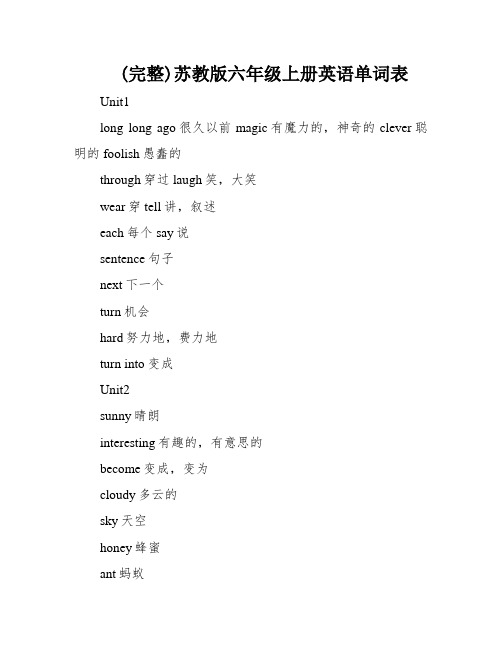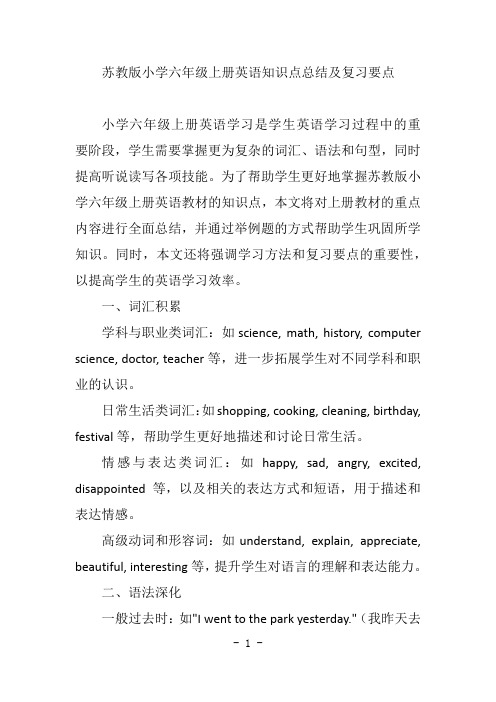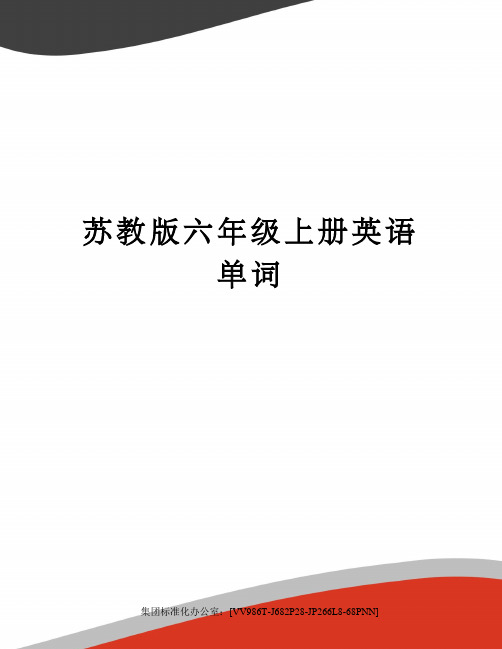苏教版六年级英语上
苏教版六年级英语上册知识点完整版

苏教版六年级英语上册知识点集团标准化办公室:[VV986T-J682P28-JP266L8-68PNN]U n i t1T h e k i n g’s n e w c l o t h e s一、单词/词组1.long long ago 很久以前2.new clothes 新衣服3.make new clothes for you 为你制作新衣服 make sth for sb4.show the king his new clothes给皇帝展示新衣服show sb. sth.= show sth. to sb.5.try on 试穿 try on the coat=try the coat ontry it/them on6.magic clothes 有魔力的衣服7.walk through步行穿过8.in his new clothes 穿着他的新衣服9.shout at sb. 对某人大叫ugh at sb. 对某人大笑11.look at 看….12.point at 指向…13.fit well 非常适合14.an American cowboy 一个美国牛仔15.a Scottish man 一位苏格兰人16.tell a story 讲一个故事17.say a/one sentence 说一句话18.on the mountain 在山上19.the next sentence 下一句话20.live in the house 住在房子里21.tell the boy a story 给这个男孩讲一个故事 tell sb. sth.22.it is one’s turn 某人的机会23.think hard 努力思考24.have to 不得不 have to do sth.25.in front of 在….前面(外部) in the front of 在…前面(内部)26.walk by 路过27.be nice to sb. 对某人好28.look after 照顾29.turn into 变成二、句型1.Long long ago, there was a king. 很久很久以前,有一位国王。
苏教版六年级英语上册知识点

U n i t1T h e k i n g’s n e w c l o t h e s一、单词/词组1.?long long ago 很久以前2.?new clothes 新衣服3.?make new clothes for you 为你制作新衣服make sth for sb4.?show the king his new clothes给皇帝展示新衣服show sb. sth.= show sth. to sb.5.?try on 试穿try on the coat=try the coat ontry it/them on6.?magic clothes 有魔力的衣服7.?walk through步行穿过8.?in his new clothes 穿着他的新衣服9.?shout at sb. 对某人大叫10.?laugh at sb. 对某人大笑11.?look at 看….12.?point at 指向…13.?fit well 非常适合14.?an American cowboy 一个美国牛仔15.?a Scottish man 一位苏格兰人16.?tell a story 讲一个故事17.?say a/one sentence 说一句话18.?on the mountain 在山上19.?the next sentence 下一句话20.?live in the house 住在房子里21.?tell the boy a story 给这个男孩讲一个故事tell sb. sth.22.?it is one’s turn 某人的机会23.?think hard 努力思考24.?have to 不得不have to do sth.25.?in front of 在….前面(外部)in the front of 在…前面(内部)26.?walk by 路过27.?be nice to sb. 对某人好28.?look after 照顾29.?turn into 变成二、句型1.?Long long ago, there was a king. 很久很久以前,有一位国王。
(完整)苏教版六年级上册英语单词表

(完整)苏教版六年级上册英语单词表Unit1long long ago很久以前magic有魔力的,神奇的clever聪明的foolish愚蠢的through穿过laugh笑,大笑wear穿tell讲,叙述each每个say说sentence句子next下一个turn机会hard努力地,费力地turn into变成Unit2sunny晴朗interesting有趣的,有意思的become变成,变为cloudy多云的sky天空honey蜂蜜ant蚂蚁cloud云rainy多雨的lose丢失What happened?出什么事了?hold onto抓紧Unit3quick疾速的,快的little小的,年幼的think想,考虑child孩子show展览,展现weather天气windy有风的high在高处bring带来drink饮料bee蜜蜂rain下雨meet遇见know知道climb up爬上fly away飞走holiday假日,假期national day国庆节call打电话Bund (上海)外滩Shanghai museum上海博物馆star星星Great wall长城Palace museum故宫Summer palace颐和园Tian’anmens quare天安门广场fashion show古装扮演,古装秀excited冲动的,镇静的paper纸bottle瓶子at first入手下手,最后Unit4then and now曩昔和现在use使用,使用office办公室anywhere到处,处处newspaper报纸watch寓目make friends交同伙do shopping购物look out of朝…外看still仍然spell拼读,拼写make a sentence造句yesterday昨天Unit5sign标识ask问go well进展顺利heavy rain大雨ago……以前telephone德律风mobile phone挪动德律风,radio收音机news新闻e-book电子书all over the world全世界TV电视go on连续what day is today?今天是星期几?with用shopping centre购物中心careful小心,当心what does it mean?mean意思是它是什么意思?floor地面litter乱扔垃圾go in进入,走进take…into带入restaurant饭铺,餐厅someone或人smoke吸烟,抽烟smell闻到No eating or drinking请勿饮食No parking请勿停车Danger危险outing外出玩耍,郊游around在…周围Unit6keep保持,维持make使…变得dirty肮脏的rubbish渣滓dead死的bin垃圾桶more更多的throw扔ground空中,地上slip滑倒Unit7protect保护no littering请勿乱扔垃圾no smoking请勿吸烟wet floor小心地滑walk on连续走路clean干净,整洁air空气smoke烟雾messy肮脏的,杂乱无章的move…away from从…搬走plant种植,栽种museum博物馆skin果皮pick…up捡起,拾起fall跌倒earth地球save节省useful有效的much良多waste浪掷reuse再利用energy能源most大部分come from从…来,来自coal煤炭oil石油drive开车,驾驶wood木头,木材other其他的too much太多plastic塑料project课题gate大门Unit8get收到,接到next week下周tangyuan汤圆Chinese New Year’s Day大年初一,春节lion dance舞狮firecracker鞭炮plan计划,打算light扑灭cut down砍伐,砍掉too many太多glass玻璃poster海报Hong Kong香港food食物,食品Chinese New Year’s Eve 大年夜,除夕red packet红包fireworks烟花表演rich富有的,有钱的。
苏教版小学六年级上册英语知识点总结及复习要点

苏教版小学六年级上册英语知识点总结及复习要点小学六年级上册英语学习是学生英语学习过程中的重要阶段,学生需要掌握更为复杂的词汇、语法和句型,同时提高听说读写各项技能。
为了帮助学生更好地掌握苏教版小学六年级上册英语教材的知识点,本文将对上册教材的重点内容进行全面总结,并通过举例题的方式帮助学生巩固所学知识。
同时,本文还将强调学习方法和复习要点的重要性,以提高学生的英语学习效率。
一、词汇积累学科与职业类词汇:如science, math, history, computer science, doctor, teacher等,进一步拓展学生对不同学科和职业的认识。
日常生活类词汇:如shopping, cooking, cleaning, birthday, festival等,帮助学生更好地描述和讨论日常生活。
情感与表达类词汇:如happy, sad, angry, excited, disappointed等,以及相关的表达方式和短语,用于描述和表达情感。
高级动词和形容词:如understand, explain, appreciate, beautiful, interesting等,提升学生对语言的理解和表达能力。
二、语法深化一般过去时:如"I went to the park yesterday."(我昨天去了公园。
)学生需要理解并掌握一般过去时的动词形式和用法。
现在完成时与过去完成时的对比:如"I have already finished my homework."(我已经完成了我的作业。
)和"I had finished my homework before you came."(你来之前我已经完成了作业。
)学生需要理解并掌握两种时态的区别和用法。
条件状语从句的进一步应用:如"If I had more time, I would travel around the world."(如果我有更多的时间,我会环游世界。
苏教版六年级英语上册Unit1单元知识归纳

六上Unit1 单元知识一、词组1皇帝的新衣the king’s new clothes 2很久以前long long ago3某一天one day4两个男子two men5拜访国王visit the king6为你做新衣服make new clothes for you7给国王看他的新衣show the king his new clothes8试穿try on9这些魔法衣服these magic clothes 10聪明的人clever people11愚蠢的人foolish people12穿着他的新衣in his new clothes= wear his new clothes 13许多人a lot of people14在街上in the street15看着国王look at the king16 一个小男孩a little boy17指着国王point at the king18嘲笑他laugh at him19非常合身fit well20穿着黄色毛衣wear yellow sweater 21在四点半at half past four22穿着牛仔裤wear jeans23讲故事tell a story24每个学生each student25下一句the next sentence26轮到波比了It is Bobby’s turn.27努力地想think hard28下一句是什么?What’s next?29不得不重新开始讲故事have to start the story again30在狮子的房子前面in front of the lion’s house31在房子旁边散步walk by the house 32对着老人大喊shout at the old man 33把你的孩子给我give me your child= give your child to me 34和狮子住在一起live with the lion 35对她很好be nice to her36照顾他look after him37快点be quick38穿过城市walk through the city39 在山上on the mountain40 住在森林里live in the forest41 愤怒的狮子the angry lion42 生病了be sick / be ill43 变成一个王子turn into a prince △44 一个苏格兰男士a Scottish man△45 穿一条苏格兰裙wear a kilt △46 一个美国牛仔an American cowboy二、句型1. Long long ago, there was a king. 很久以前,有以为国王。
苏教版六年级上册英语单词

瓶子
12
go well
[g?? wel]
进展顺利
13
at first
[?t f??st]
开始,最初
14
heavy rain
['hev? re?n]
大雨
6A Unit 4
记号
序号
英文
音标
中文
记号
1
then and now
[een ?nd na?]
过去和现在
2
ago
[?'g??]
……以前
['de?n(d)??]
危险!
18
Wet floor.
[wet fl??]
小心地滑。
19
Outing
['a?t??]
外出游玩,远足
20
walk on
[w??k ?n]
继续走路
21
around
[?'ra?nd]
在……周围
6A Unit 6
记号
序号
英文
音标
中文
记号
1
keep
[ki?p]
保持,维持
2
Clean
9
news
[nju?z]
新闻
10
e-book
[i:-b?k]
电子书
11
make friends
[me?k frendz]
交朋友
12
all over the world
[??l '??v? e? w??ld]
全世界
13
do shopping
[du? '??p??]
购物
苏教版六年级上册英语单词完整版
9
news
[nju?z]
新闻
10
e-book
[i:-bk]
电子书
11
make friends
[mek frendz]
交朋友
12
all over the world
[l 'v e wld]
全世界
13
do shopping
[du 'p]
购物
14
TV
['ti:'vi:]
电视
15
look out of
[lk at v]
[red 'p?kt]
红包
8
lion dance
['lan dɑ?ns]
舞狮
9
fireworks
['fawk]
烟花表演
10
Firecracker
['fa'kr?k]
鞭炮
11
Rich
[[rt]富有的,有钱的]
富有的,有钱的
12
plan
[pl?n]
计划,打算
13
hooray
[[h're]]
好极了
['ltr]
请勿乱扔垃圾。
15
No parking.
['pɑ?k]
请勿停车。
16
No smoking.
['smk]
请勿吸烟。
17
Danger!
['den(d)]
危险!
18
Wet floor.
[wet fl]
小心地滑。
19
Outing
['at]
苏教版小学六年级上学期英语试题与参考答案
苏教版英语小学六年级上学期模拟试题与参考答案一、听力部分(本大题有12小题,每小题2分,共24分)1、What does the teacher ask the student to do in this dialogue?A. Draw a picture.B. Write a letter.C. Tell a story.D. Read a book.Answer: CExplanation: The teacher says, “Please tell us a story about your summer vacation.” This indicates that the teacher is asking the student to tell a story, not draw a picture, write a letter, or read a book.2、What is the weather like on the day of the conversation?A. SunnyB. RainyC. CloudyD. WindyAnswer: BExplanation: The conversation between the two people includes the following exchange: “It’s a rainy day today, isn’t it?” and “Yes, it is. We can’t go outside to play.” This indicates that the weather is rainy on the day ofthe conversation.3、Question: What are the speakers discussing?A) A new school tripB) The weather forecastC) A book they recently readAnswer: A) A new school tripExplanation: The conversation between the speakers includes mentions of preparing for a school trip, packing bags, and excitement about the trip, which indicates they are discussing a new school trip.4、Question: What is the reason the students are happy?A) They are going to have a long weekend.B) They received good grades on their last test.C) They are going to the zoo for a field trip.Answer: C) They are going to the zoo for a field trip.Explanation: In the dialogue, the students express excitement about visiting the zoo, which suggests that their happiness is due to the upcoming field trip to the zoo.5、What does the boy want to do after school?A. Go to the libraryB. Play basketballC. Visit his grandparentsScript for Question 5:Boy: Hey, Mum, can I go and play basketball with my friends after school today? We have a match to practice for.Mum: Sure, honey. Just make sure you’re back before dinner.Answer: B. Play basketballExplanation: The boy asks his mother if he can go and play basketball with his friends, which indicates that this is what he wants to do after school.6、Where are they going to meet?A. At the bus stopB. In front of the cinemaC. Next to the parkScript for Question 6:Girl 1: So, we’re all set for the movie tonight, right?Girl 2: Yes, I’m so excited! Where should we meet?Girl 1: How about in front of the cinema at 7 o’clock?Girl 2: Sounds good to me!Answer: B. In front of the cinemaExplanation: The girls agree to meet in front of the cinema for their movie night, making option B the correct choice.In a classroom setting, the teacher would play the audio clips, and the students would select the appropriate answers. For self-study or homework, the scripts can be read aloud by the student or a parent, and the student can then answer the questions.7.What is the name of the school where the speakers are currently studying?A. SuJiao Primary SchoolB. HuaShan Middle SchoolC. Nangang High SchoolD. Jinggangshan UniversityAnswer: AExplanation: The first speaker mentions, “Well, as you know, I’m studying at SuJiao Primary School.” This indicates that they are currently studying at SuJiao Primary School.8.Which of the following is NOT a subject they are studying this semester?A. EnglishB. MathematicsC. HistoryD. Physical EducationAnswer: CExplanation: The second speaker says, “So far this semester, we’ve been studying English, Mathematics, and Physical Education. I’m not sure if we’re taking History this semester or not.” This implies that History is not a subject they are studying this semester.9、You will hear a dialogue between two friends talking about their weekend plans. Listen carefully and choose the correct answer to the following question.Question: What are they planning to do on Saturday?A)Go to the moviesB)Visit a museumC)Play soccer in the parkAnswer: B) Visit a museumExplanation: In the dialogue, the two friends discuss various activities they could do over the weekend. They eventually agree on visiting a museum because there is a new exhibition that one of them is very interested in seeing.10、Listen to a short conversation between a student and a teacher discussing an upcoming school trip. Choose the correct answer to the following question.Question: Where are the students going for their school trip?A) A science fairB) A historical siteC)An amusement parkAnswer: A) A science fairExplanation: The student and teacher talk about preparations for the school trip. The teacher mentions that the students need to bring notebooks to take notes at the science fair, indicating that the destination of the trip is a science fair where they can learn about new inventions and scientific projects.11.You are listening to a conversation between two friends, Jack and Lily. Listen carefully and answer the question.Q: What does Jack want to do after school?A. Go to the library.B. Play soccer.C. Visit a museum.Answer: BExplanation: In the conversation, Jack says, “I’m going to play soccer after school with my friends.” Therefore, the correct answer is B. Play soccer.12.Listen to a short dialogue between a teacher and a student, and answer the question.Q: What is the student’s favorite subject?A. Math.B. Science.C. History.Answer: AExplanation: The student responds to the teacher’s question about favorite subjects with, “I really like math.” This indicates that the c orrect answer is A. Math.二、选择题(本大题有12小题,每小题2分,共24分)1、What time do you usually have breakfast?A. At seven o’clockB. In the morningC. On SundayD. For an hourAnswer: A. At seven o’clockExplanation:The question asks for a specific time when someone usually has breakfast. “At seven o’clock” is the only option that gives a specific time. “In the morning” is too general, “On Sunday” refers to a day rather thana time, and “For an hour” describes a duration, not a point in time.2、Which of the following sentences is correct?A. She enjoy playing the piano.B. They are going to watch a movie tomorrow.C. He go to school by bus every day.D. We was at home last night.Answer: B. They are going to watch a movie tomorrow.Explanation:This sentence is grammatically correct. “A. She enjoy playing the piano” should be “She enjoys playing the piano” to match the subject-verb agreement. “C. He go to school by bus every day” should be “He goes to school by bus every day.” “D. We was at home last night” should be “We were at home last night,” as “were” is the correct past tense form of “to be” for the plural subject “we.”3、What is the correct way to spell “the”?A. theeB. theeC. tehD. theAnswer: DExplanation: The correct spelling of “the” is option D. “The” is a definite article used before singular nouns to indicate that the noun is specific or known to both the speaker and the listener. The other options do not correctly spell the word “the.”4、Which sentence is correct?A. I am going to school by bus tomorrow.B. I will go to school by bus tomorrow.C. I am going school by bus tomorrow.D. I go to school by bus tomorrow.Answer: BExplanation: The correct sentence is option B. “I will go to school by bus tomorrow” is in the future s imple tense, which is used to talk about actions that will happen in the future. Options A and C have grammatical errors, while option D is in the present simple tense, which is not appropriate for talking about future actions.5、Choose the correct form of the verb in the following sentence:She________her homework every day.A)doesB)doC)didD)doingAnswer: A) doesExplanation: The correct answer is “does” because the subject “she” isthird-person singular, and the sentence indicates a regular action using “every day.” Therefore, the simple present tense of the verb “do” must be conjugated to “does.”6、Complete the sentence with the appropriate comparative adjective:The elephant is________than the mouse.A)biggerB)bigC)biggestD)more bigAnswer: A) biggerExplanation: The correct answer is “bigger” because we use the comparative form of adjectives when comparing two things, and “big” becomes “bigger” when comparing the elephant to the mouse. Options B, C, and D are incorrect forms or usages in this context.7、What is the past tense of the verb “do”?A. doB. didC. doingD. doneAnswer: B. didExplanation: The past tense of the verb “do” is “did”. It is used to talk about actions that were completed in the past.8、Choose the correct word to complete the sentence.The cat_______on the mat.A. sitB. sitsC. sittingD. satAnswer: B. sitsExplanation: The correct form of the verb to use in this sentence is the present simple tense because there is no indication of a past or future action. The correct form is “sits”.9.Choose the correct word to complete the sentence.The cat was very_______when it saw the mouse.A. happyB. angryC. sadD. excitedAnswer: C. sadExplanation: The sentence implies that the cat’s reaction to seeing the mouse was negative, which is best described by the word “sad.”plete the sentence with the correct form of the verb in brackets.They_______(be) in the park when I called them.A. isB. areC. wasD. wereAnswer: D. wereExplanation: The sentence talks about an action that was happening in the past, so the correct form of the verb to use is the simple past tense “were.”11、Choose the correct word to complete the sentence.A. interestingB. interestinglyC. interestsD. interestedAnswer: A. interestingExplanation: The sentence needs an adjective to describe the noun “book.” “Interesting” is the correct adjective in this context.12、Select the sentence that is grammatically correct.A. He is very good to play the piano.B. He is very good in playing the piano.C. He is very good at play the piano.D. He is very good at playing the piano.Answer: D. He is very good at playing the piano.Explanation: The correct preposition to use after “good” when describing someone’s skill is “at.” Option D is the only sentence with the correct preposition and structure.三、完型填空(10分)Section 3: Cloze TestRead the following passage and choose the best word for each blank from the options given below.Tom was an animal lover. Every weekend, he would visit the local [1] to check on his favorite animals. One day, he decided to volunteer at the [2] for a whole day.The animals there were [3]. He spent the morning cleaning the enclosures and feeding the animals. In the afternoon, he helped the vet with some [4]. It was a tiring but rewarding day.1.A. farmB. parkC. zooD. school2.A. libraryB. hospitalC. museumD. market3.A. hungryB. happyC. tiredD. sick4.A. gamesB. sportsC. showsD. surgeriesAnswers:1.C. zoo2.C. museum3.B. happy4.D. surgeries四、阅读理解(26分)Reading ComprehensionRead the following passage carefully and answer the questions below.Once upon a time, in a small village near the sea, there lived a boy named Tom. Tom was not like other boys in his village. He was very curious and loved to explore. One day, Tom’s father gave him a small boat and told him to go out to sea to find adventure.Tom was excited and set off early in the morning. He rowed his boat for hours, and as the sun began to set, he saw a beautiful island in the distance. He decided to dock his boat there and spend the night. When he stepped onto the island, he was amazed by its beauty. The trees were tall and green, and the flowers were colorful and fragrant. Tom felt like he had stepped into a fairy tale.As he walked around the island, he discovered a small cave. He was curious and decided to explore it. Inside the cave, he found a hidden treasure chest. The chest was filled with shiny gold coins and precious jewels. Tom was overjoyed and knew he had found something special.However, as he tried to leave the cave, he realized he had locked the door behind him. He was trapped! Tom began to panic, but then he remembered his father’s words about exploring and not giving up. He started searching for a way to escape.After hours of searching, Tom finally found a hidden passage behind a rock. He hurriedly ran through the passage and emerged outside the cave. He was free at last! Tom quickly returned to his boat and rowed back to the village.The next day, Tom told his father about his adventure. His father was surprised and proud of his courage. From that day on, Tom became famous in the village as the boy who found the hidden treasure on the island.Questions:1.Where did Tom live?A) In a big cityB) In a small village near the seaC) In a forestD) In a mountain2.What did Tom’s father give him?A) A bicycleB) A small boatC) A mapD) A treasure chest3.How did Tom feel when he found the hidden treasure?A) SadB) ScaredC) OverjoyedD) BoredAnswers:1.B) In a small village near the sea2.B) A small boat3.C) Overjoyed五、写作题(16分)Imagine you are a student in a primary school. You recently visited a local park with your class. Write a short passage describing your experience. Be sure to include the following points:1.What did you see when you arrived at the park?2.What activities did you and your classmates do?3.What was your favorite part of the visit?4.How did you feel about the visit?Example:Last week, our class went on a field trip to the local park. When we arrived,we were greeted by the sight of lush green trees and colorful flowers. The park was filled with children playing and laughing, making it a lively and cheerful place.We spent the day engaging in various activities. First, we had a picnic and enjoyed delicious snacks with our classmates. Then, we went on a nature walk, where we learned about different plants and animals. We also played games like hide and seek and tag, which were a lot of fun.My favorite part of the visit was when we had a mini scavenger hunt. We had to find items like a red feather, a green leaf, and a blue stone. It was exciting to search for these items and work together with my friends to complete the task.I felt very happy about the visit to the park. It was a great opportunity to learn outside the classroom and enjoy the beauty of nature. I can’t wait for our next field trip!Analysis:The example passage follows the given structure and includes all the required points. It provides a clear and detailed description of the park visit, including the sights, activities, favorite part, and feelings. The passage is written in a simple and coherent manner, making it easy to understand. The writer also demonstrates the ability to use a variety of sentence structures and vocabulary.。
六上英语unit2单元课文苏教版
六上英语Unit 2 单元课文苏教版一、概述本单元主要围绕"Lesson One: My School"展开,通过介绍学校及学校生活的内容,帮助学生们了解英语中有关学校的相关词汇和表达,并培养学生对学校的归属感。
通过本单元的学习,学生们将能够掌握一些关于学校的常用词汇及表达,并能够进行简单的日常对话。
二、课文内容本单元的主要课文"Lesson One: My School"主要介绍了学生Tom 和他的朋友们对他们学校的描述。
课文涵盖了学校的名称、位置、规模、设施、老师和校车等方面的内容,内容贴近学生的日常生活,易于理解并引起学生们的共鸣。
通过这篇课文,学生们将能够了解更多关于学校的信息,对于扩大他们的英语词汇量和日常用语的学习将起到很好的辅助作用。
三、教学方法1.听说结合:通过听力训练,让学生们接触到真实的英语语言环境,培养学生们的英语听力能力,同时通过仿真对话训练,提高学生们的口语表达能力。
2.情景教学:通过展示图片、模拟学校环境等方式,让学生们在具体的情景中学习,提高学生们对学校英语词汇的记忆和掌握。
3.互动教学:通过小组合作学习、角色扮演等形式,培养学生们合作意识,增强学习的趣味性和实效性。
四、教学目标1.了解学校及学校生活方面的基本词汇和表达。
2.能够进行简单的对话,描述自己的学校及学校周围环境。
3.培养学生对学校的归属感,增强学生的自信心。
五、教学过程1. 导入:通过图片展示、唱歌等方式引出学校及学校生活的主题,引起学生们的兴趣,并激发学生们的学习欲望。
2. 学习主要词汇:通过图片、板书等方式介绍有关学校的词汇,加强学生们对学校词汇的记忆。
3. 听力训练:播放相关听力材料,并进行配套的听力题目,训练学生的听力技能。
4. 口语训练:通过模仿对话、角色扮演等方式,让学生们进行口语训练,提高学生的口语表达能力。
5. 情景对话:设计情景对话,让学生们在具体的情境中进行角色扮演,巩固学习成果。
苏教版六年级上册英语复习资料
苏教版六年级上册英语复习资料六年级上册复习资料内含 :6A各单元知识点 , 语法知识 ,易错题及合适形式填空6A Unit 1 The king’ s new clothes姓名 :一,单词 /词组1、 long long ago好久从前 2 、 new clothes 新衣服3、 make new clothes for you为您制作新衣服make sth for sb4、 show the king his new clothes给皇帝展现新衣服show sb 、 sth 、 = show sth、 to sb 、5、 try on 试穿try on the coat=try the coat ontry it/them on6、 magic clothes有魔力的衣服7、 walk through步行穿过8、 in his new clothes衣着她的新衣服9、 shout at sb 、对某人大喊 10、 laugh at sb、对某人大笑11、 look at瞧、12 、 point at指向13、 fit well特别合适14 、 an American cowboy一个美国牛仔15、 a Scottish man一位苏格兰人16 、 tell a story讲一个故事17、 say a/one sentence说一句话18 、 on the mountain在山上19、 the next sentence下一句话20 、 live in the house住在房屋里21、 tell the boy a story给这个男孩讲一个故事tell sb 、 sth 、22、 it is one’ s turn某人的时机23 、 think hard努力思虑24、 have to不得不have to do sth 、25、 in front of在、前方 (外面 ) in the front of在前方(内部)26、 walk by经过27 、 be nice to sb 、对某人好28、 look after照料29 、 turn into变为二,句型1、 Long long ago, there was a king、好久好久从前 ,有一位国王。
- 1、下载文档前请自行甄别文档内容的完整性,平台不提供额外的编辑、内容补充、找答案等附加服务。
- 2、"仅部分预览"的文档,不可在线预览部分如存在完整性等问题,可反馈申请退款(可完整预览的文档不适用该条件!)。
- 3、如文档侵犯您的权益,请联系客服反馈,我们会尽快为您处理(人工客服工作时间:9:00-18:30)。
1、本的堂兄/妹
2、(只有)四岁
3、有许多问题
4、公共标志
5、问/答问题
6、表示不同的东西
7、在墙上
8、远离
9、不接近草地10、践踏草坪
11、安静12、制造噪音
13、对……了解很多14、禁止吸烟
15、禁止乱丢杂物16、禁止停车
17、禁止触摸18、禁止吃喝
19、散步20、一张10元的钞票21、给我10元钱22、环顾
23、附近没有人24、拾起
25、一个公园管理员26、上来
27、指着28、罚款10元
29、穿绿毛衣的男孩
30、穿绿衣服的男孩
句子:
1、杰克只有一岁但他总是有许多问题。
2、他正在问本有关它们的问题。
3、这儿有许多标志。
4、它指的是什么?它的意思是“危险”。
5、我可以进去吗?不,你不可以,你必须远离它。
6、它的意思是我们不该践踏草地。
7、它们的意思是什么?它们表示不同的东西。
8、你不可以在教室里吃喝。
9、史密斯先生每天在公园散步。
10、杰克现在对公共标志了解了很多。
11、鸟笼上的标志很有趣。
1、本的生日
2、一位新生
3、在本/我的班上
4、住在……附近
5、一起回家
6、放学后
7、拜访吉姆/他8、谈论
9、举行生日聚会10、等着瞧
11、想要做某事12、我愿意看/做
13、作为生日礼物14、日本动画片
15、在10月18日16、几号
17、有许多葡萄的蛋糕
18、在生日聚会上19、脱下他的戏服
20、对本唱生日歌
21、吹灭蜡烛22、到……的时间了
句子:
1、吉姆是本班上的一名新学生。
他住在本的附近。
2、放学后本和吉姆经常一起回家。
3、他们正在讨论本的生日。
4、吉姆今天几号?十月十六日。
5、你的生日是什么时候?是十月十八日。
6、你想来参加我的生日聚会吗?
7、你常举行生日聚会吗?、
8、你想用什么作为你的生日礼物?
9、本正在举行生日聚会。
10、麦克正在给本一些卡通片作为生日礼物。
11、本正在吹灭蛋糕上的蜡烛。
12、到吃蛋糕的时间了。
1、2、3特殊记第一其余要加th 第四第十三8省t,9减e 第八第九
逢几十变y为is加th 第三十
若是遇到几十几,变变个位就可以第四十四
1、体育运动日
2、寻找
3、拍照片
4、观看赛跑
5、一场激动人心的赛跑
6、片刻前/刚才
7、帮助她/他./我/他们/我们
8、在地面上
9、为我捡起来他们10、一副眼镜
11、一卷胶卷12、刚才
13、在照相机的后面14、在梨树下面15、告诉某人有关……的事16、试着记住……句子:
1、这场赛跑真令人激动。
所有的学生都非常激动。
2、你的日记本在哪里?它在这儿。
3、眼镜在哪里?他们在那儿。
他们片刻前在这儿的。
4、昨天你在哪里?我在南京。
5、我的手机不在包里。
6、耳机刚才不在书上。
7、今天早上胶卷在照相机后面吗?是的。
/不是。
8、三天前你姐姐的书在书架上吗?是的。
/不是。
9、十月一日你爸爸在泰兴吗?是的,在。
/不在、
10、刚才你在办公室里吗?是的,在。
/不在。
Is/are的过去式
例:The pair of glasses is on the desk now.,but the glasses there.. Two pairs of glasses om the desk mow,,but they here just now.。
1、国庆假
2、在农场
3、早早地上学
4、课前
5、课后
6、一部搞笑的卡通片
7、持电影8、参观农场
9、浇树10、拔萝卜11、挤牛奶
12、水果树13、摘橘子14、收集鸡蛋15、苹果树16、去野营17、在山中散步18、累了19、开心20、做许多食物21、我右边的灯22、听音乐
23、为我奶奶打扫房间24、上周
25、上周末26、在周末27、在野营地28、在学校操场上29、品尝他们
30、玩游戏31、开学第一天
句子:
1、上周二我和家人看了一场电影。
2、苏杨经常课前遇到南希。
3、上周末你在农场挤牛奶吗?是的。
/没有。
4、那天我不在家。
你干什么了?我弹钢琴的。
你还干什么了?我和妈妈去购物的。
5、两周前我没有拔萝卜。
6、晚上你通常做什么?我通常做家庭作业。
你姐姐呢?她通常看杂志。
7、那真是有趣的事。
8、上周你在哪里?
9、我在一个野营营地。
10、迈克喜欢去野营。
11、我也想去野营。
节日名称:
1、元旦
2、劳动节
3、儿童节
4、国庆节
5、春节
6、圣诞节
7、万圣节
8、端午节
9、中秋节10、复活节11、教师节(表示“在”某个节日时,节日名称中有Day的用介词“”;其余用“”。
如:New Year’s Day, Christmas, Christnas Day, Spring Festival)1、变得激动2、对学生讲有关节日的事
3、在……之后
4、当然
5、吃月饼
6、走亲访友
7、穿戏服装扮
8、玩灯笼9、我最喜爱的节日
赏月11、去聚会12、举行聚会13、一个流行的节日14、在一月或二月
15、吃许多可口的食物16、去海南
17、龙舟赛18、送礼物给你朋友
19、和我的家人一起度过时光20、去海滩21、一封来自我笔友的信22、吃米粽子句子:
1、圣诞节快炙了,学生变激动了。
2、劳动节前到来的是什么节日?
3、中秋节是什么时候?在九月或十月。
4、人们在中秋节通常干什么?
他们通常吃月饼。
他们也赏月。
5、去年春节你走亲戚了吗?
是的。
/没有。
6、你最喜爱的节日是什么?
7、你姐姐最喜爱的节日是什么?
8、人们通常有一个长假。
9、孩子们通常在学校举行聚会。
10、去年我看了龙舟赛。
11、去年春节他们吃了许多美味食物。
词组:
1、在圣诞节
2、这么多的礼物
3、一个漂亮的钱包
4、在圣诞树下
5、为我打开它
6、喜欢喝茶
7、别客气8、在房子前面
9、我前面的妇女10、他旁边的女孩
11、在公共汽车后部12、下车13、来自14、警察局15、他的茶壶16、吉姆的家人17、回答我的问题18、请某人做某事
19、带这本书给他20、足球图片
句子:
1、昨天吉姆的家人在他祖父母家的。
2、元旦就快来了,每一个人都激动。
3、这是谁的手表?(两种)
是我的。
4、这些滑板是谁的?(两种方式)
是他们的。
5、我的梳子是红色的,他的不是红色的。
6、我收到父母送的两份礼物。
7、那些礼物是谁送的?杰克送的。
8、今天早上我请司机把钱包带到警察局。
9、昨天南希坐在公共洗车的后部。
不久汽车停了,她下车了。
10、刚才我看见CD随身听在座位下面。
